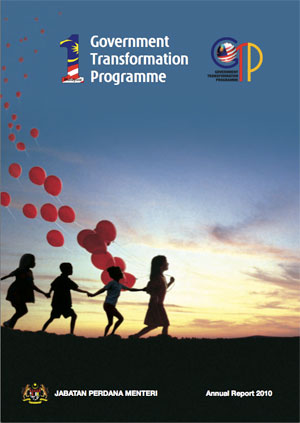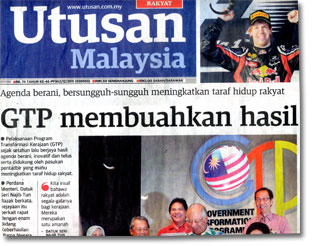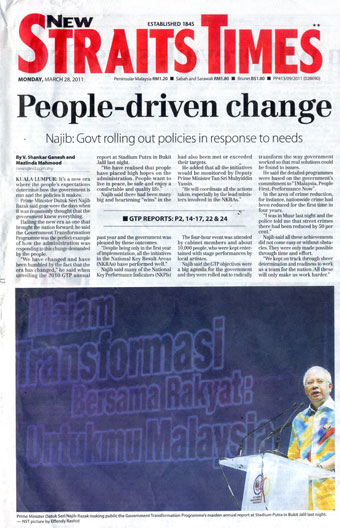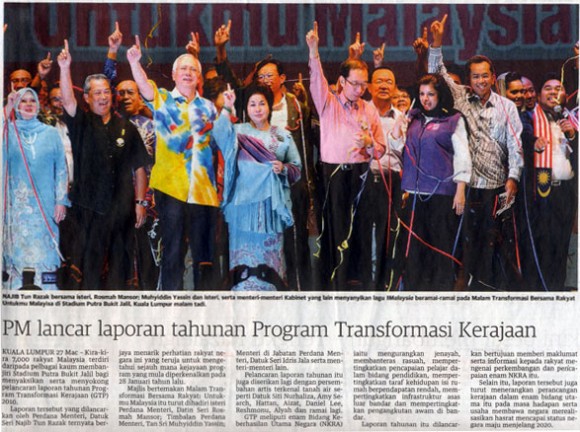
*Updated 4 April 2011
GOOD journalism involves asking the right questions. Asking who, what, when, where, why and how is part and parcel of any journalist’s toolkit. But how effectively did the traditional* print media apply these tools when reporting on the recent Government Transformation Programme (GTP) first year celebrations? Were there some questions, perhaps, that they failed to ask in their coverage of the annual report?
According to its website, the GTP, launched a year ago is meant to transform the government to become more accountable and effective in delivery of services, with a higher standard of living for all Malaysians. It identifies six National Key Result Areas (NKRA) needing attention — reducing crime, fighting corruption, improving education, raising low-income households’ living standards, improving rural basic infrastructure and improving urban public transport.
The government celebrated the GTP’s first year achievements on 27 Mar 2011 at the Bukit Jalil Putra Stadium at a star-studded event entitled Malam Transformasi Bersama Malaysia: Untukmu Malaysia.
Sweet and shallow

The traditional* print media’s coverage of the event and the GTP’s achievements announced that the night was glowing.
“GTP membuahkan hasil” declared Utusan Malaysia‘s 28 Mar 2011 front page headline. “Brave agenda, committed to improving rakyat’s standard of living,” said the sub-heading. “Approximately 7,000 Malaysians from various races crowded the Bukit Jalil Putra Stadium to witness and support the launch of the GTP 2010 annual reports,” said the accompanying news story on page three.
The Star was equally gushing. Its front page showed Prime Minister Datuk Seri Najib Razak raising his hand jubilantly on stage accompanied by his wife; Deputy Prime Minister Tan Sri Muhyiddin Yassin and his wife; and cabinet members. “Forward 1Malaysia” read the caption. The inside news stories were also overwhelmingly positive. The Star’s headlines read as follows: “Thumbs up for GTP”; “Seeking success”; “Positive report card for Govt”; “44,600 households no longer hardcore poor”; “Encouraging feedback for GTP from the rakyat” and “Great strides in fight against crime and graft”.
The New Straits Times had eight pages of coverage on the GTP annual report, including on its front page. All eight pages detailed the GTP’s successes. None were even remotely critical.
Reports in all the above newspapers mentioned the reduction of nationwide crime, the improvement in corruption-fighting initiatives and better student outcomes. They also highlighted the improvement of rural infrastructure, urban public transport and significantly, the lifting of almost 44,600 households from the hardcore poor category. The New Straits Times reported that only 108 hardcore poor households remained as of 31 Dec 2010.
Another Malaysia?

Seriously, which Malaysia were these newspapers reporting on? From their reports, one could conclude that our nation is well on its way to solving all its problems and could possibly even be on the brink of Utopia.
It is just incredible that there was not a single report in any of these newspapers on 28 Mar 2011 which questioned the real effectiveness of the GTP.
It certainly cannot be that the newsrooms were unaware of the serious issues still troubling our nation.
Street crime still feels prevalent to many, with reports of kidnapping, rape and robberies still commonplace. Just a week before its glowing review of the GTP achievements for example, The Star reported the case of a 50-year old woman being brutally beaten and robbed in Johor Baru. With crime still an issue to many, why didn’t anyone ask why the government crime statistics are going down while more gated communities and private neighbourhood security patrols are being set up?
On the education front, why didn’t any paper question why so many parents are opting out of the government school system to send their children to Mandarin-medium or private schools? Why wasn’t it raised that in some Mandarin-medium schools in Malacca, Malay Malaysian enrolment is even higher than that of non-Malay Malaysians? Didn’t anyone wonder whether these trends have anything to do with the quality of education being offered in government schools?
As for poverty, while the report said that only 108 hardcore poor families remain in the whole nation, how was this figure derived? What were the parameters? And were poor families living in the interior such as some of the Orang Asli or indigenous people of Sabah and Sarawak included in these results?
Many worrying aspects could also be raised about corruption, rural infrastructure and urban transportation, despite the great gains the government claims to have made in these areas. For example, a public poll showing that user satisfaction of overall public transport in the Klang Valley was only at 48% was published in the Metro section of The Star on the same day the GTP achievements were reported.
Unasked questions
There were surely more questions to be asked of the GTP Annual Report and its results. This was demonstrated by several articles in the online media, which demonstrated a greater willingness than their print counterparts in asking more critical questions.

For example, alongside Najib’s remarks about the GTP’s successes, The Malaysian Insider also reported how the International Performance Review committee stressed the need for civil service buy-in before the GTP’s aims could be realised. The committee stated that without their buy-in, the civil service could prove to be a stumbling block to attaining the GTP’s goals.
Malaysiakini published a letter by economist Tan Sri Dr Ramon Navaratnam which raised pertinent points such as whether the GTP’s good results were felt at the grassroots level and whether these performances could be sustained.
Media credibility

The congratulatory news reports are probably not surprising given that Barisan Nasional political parties have ownership or control, whether directly or indirectly, of Utusan Malaysia, The Star and the New Straits Times. Coupled with the government’s wide-ranging powers under the Printing Presses and Publications Act 1984 (PPPA), it’s hardly surprising that commentary critical of government policies is the exception, rather than the norm in the traditional* print media. But what would be the incentive for readers to pick up newspapers that fail to ask the necessary questions when it comes to reporting on government policies?
It may perhaps be too radical for media owners to contemplate their own newspapers being openly negative about the prized programme. However, it is not advocated that the media be negative just for negativity’s sake. But surely one or two articles that at least highlighted some challenging aspects of the GTP would have made the rest of the reports slightly more credible?
Indeed, Audit Bureau of Circulation statistics in September last year demonstrated that readers were preferring tabloids compared to the more “serious” newspapers, as far as the print media was concerned. One can only wonder: Is that a reflection on Malaysian readers’ tastes or a reflection of what they considered more believable? ![]()
Ding Jo-Ann is coordinating the media monitoring project for the Centre for Independent Journalism, where this commentary also appears.
*Update: Editor’s note – The word “mainstream” in this article has been replaced with “traditional” to reflect The Nut Graph‘s housestyle and view that “traditional” is a more accurate description to differentiate between media, since online media is becoming increasingly mainstream.


PSTAN says
In addition to the good report, i was wondering whether anyone know how much had been spend to celebrate the GTP’s first-year celebration?
Andrew I says
“But surely one or two articles that at least highlighted some challenging aspects of the GTP would have made the rest of the reports slightly more credible?”
“For example, a public poll showing that user satisfaction of overall public transport in the Klang Valley was only at 48% was published in the Metro section of The Star on the same day the GTP achievements were reported.”
“Just a week before its glowing review of the GTP achievements for example, The Star reported the case of a 50-year old woman being brutally beaten and robbed in Johor Baru.”
They just need to get their timing right and put it all on the same page.
a coin will forever has two sides says
TNG never reports any good news about BN/govt, why would TNG think that the mainstream media would want to report bad news on the government?? The media is always biased – always a lap dog of someone.
Alvin says
TNG has no reason to be biased. The site is not owned or funded by any political party unlike mainstream media.
For that matter, is there any honest good news to be reported about the government? Its quite easy to pat oneself on the back but self-praise is no praise at all.
Andrew I says
Precisely, like polishing one side of the coin.
Sam says
Which journalist from the mainstream media dares to ask a minister an ’embarrassing question’? He [or she] would be immediately thrown out of the press conference or publicly admonished. Remember Rais Yatim? He even scolded a reporter who spoke in English.
How often are reporters told not to ask this or that question, or touch on a particular topic when they approach the minister? Malaysian journalists have to mortgage their souls to the devil to work for BN.
a coin will forever has two sides says
@ Alvin & Andrew I
Media has to be sensational to attract readers, that is what precisely TNG is doing, reporting bad news on govt/BN. Good work. This is what polishing one side of the coin is all about.
Andrew I says
Reporting bad news on BN? Where?
Clarifying propaganda, yes. Polishing one side of the coin is left to those who have had years of experience.
Sensational to attract readers? Ask Utusan. They would know.